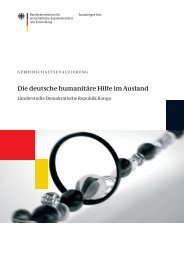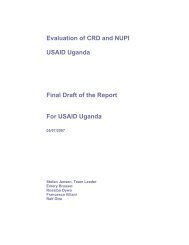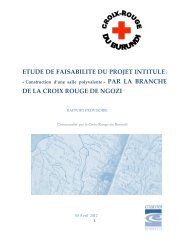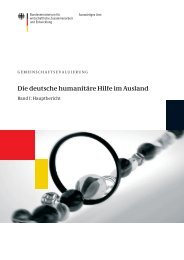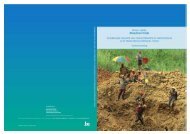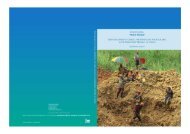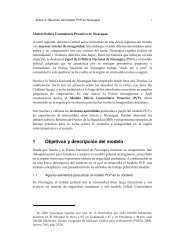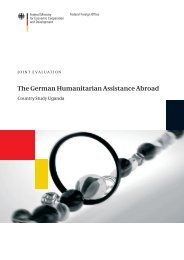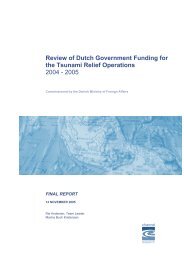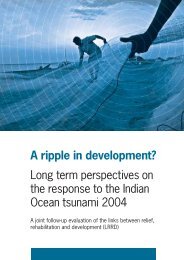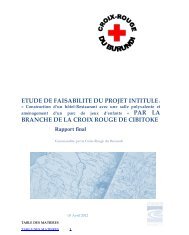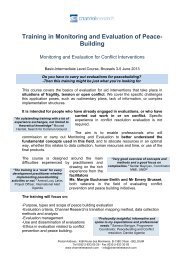Die deutsche humanitäre Hilfe im Ausland - Channel Research
Die deutsche humanitäre Hilfe im Ausland - Channel Research
Die deutsche humanitäre Hilfe im Ausland - Channel Research
Erfolgreiche ePaper selbst erstellen
Machen Sie aus Ihren PDF Publikationen ein blätterbares Flipbook mit unserer einzigartigen Google optimierten e-Paper Software.
provided to United Nations organisations<br />
(33 per cent). Non-earmarked funding<br />
(about five per cent of humanitarian<br />
assistance spending during the evaluation<br />
period), as promoted within the framework<br />
of the Good Humanitarian Donorship<br />
Principles, and joint financing<br />
arrangements (such as country-specific<br />
Common Humanitarian Funds and<br />
Emergency Response Funds and also the<br />
Central Emergency Response Fund) are<br />
rare.<br />
Although the German government is one<br />
of the largest bilateral donors of official<br />
development assistance (ODA) at<br />
international level, the share of<br />
humanitarian assistance in its total ODA is<br />
significantly below the average of other<br />
donors. German humanitarian assistance<br />
is characterised by a high percentage of<br />
earmarked project funding, using –<br />
particularly in the case of the Federal<br />
Foreign Office – a large number and a<br />
wide spectrum of German and<br />
international organisations in a great<br />
number of humanitarian crises. As the<br />
country case studies demonstrate,<br />
German humanitarian assistance at<br />
country level plays only a secondary role.<br />
This means that German humanitarian<br />
assistance as a whole is very fragmented<br />
and compartmentalised.<br />
Relevance and appropriateness<br />
Appropriately, the actors involved in<br />
German humanitarian assistance use the<br />
United Nations-coordinated flash and<br />
consolidated appeals. Because of various<br />
l<strong>im</strong>itations, however, these do not offer a<br />
complete overview of humanitarian needs<br />
and capacities on the ground. Actors in<br />
German humanitarian assistance only<br />
rarely conduct systematic and<br />
comprehensive context and needs<br />
analyses, and often do not sufficiently<br />
specify the particular needs that are to be<br />
met in the given humanitarian crisis<br />
context by the proposed measures. The<br />
ministries lack the human and technical<br />
capacities that are actually needed to<br />
assess the quality of analyses conducted<br />
by their <strong>im</strong>plementation partners. All in all,<br />
this form of needs assessment and<br />
decision-making with respect to German<br />
humanitarian assistance measures is<br />
patchy and results in a lack of clarity,<br />
comprehensibility and transparency in the<br />
selection of the financed measures,<br />
locations and target groups.<br />
The project measures undertaken by<br />
German humanitarian assistance during<br />
the evaluation period were, as<br />
demonstrated by the country case studies,<br />
for the most part relevant in terms of<br />
meeting the needs of the affected<br />
population groups and the needs of the<br />
various areas (both national and regional).<br />
German humanitarian assistance, with its<br />
often standardised approaches, is for the<br />
most part appropriate in the way it<br />
responds to sudden natural disasters. In<br />
terms of compliance with humanitarian<br />
standards, adjustments need to be made<br />
on a context-specific basis. In the<br />
protracted and complex crises which are<br />
occurring more and more frequently and<br />
often require longer-term, locally adapted,<br />
non-standardised approaches, the term,<br />
the approaches and the strategic<br />
procedures need to be adjusted. The<br />
approaches adopted are not always<br />
appropriate and are not well enough<br />
integrated with development cooperation<br />
instruments. There has so far been no<br />
debate in discussions about German<br />
humanitarian assistance regarding the<br />
consideration and realisation of the fragile<br />
state concept and the whole-ofgovernment<br />
approach. The link to national<br />
policies, strategies and programmes is still<br />
insufficient.<br />
Effectiveness and coverage<br />
The results orientation and the formulation<br />
of results-oriented objectives of German<br />
humanitarian assistance are still not<br />
xiii



